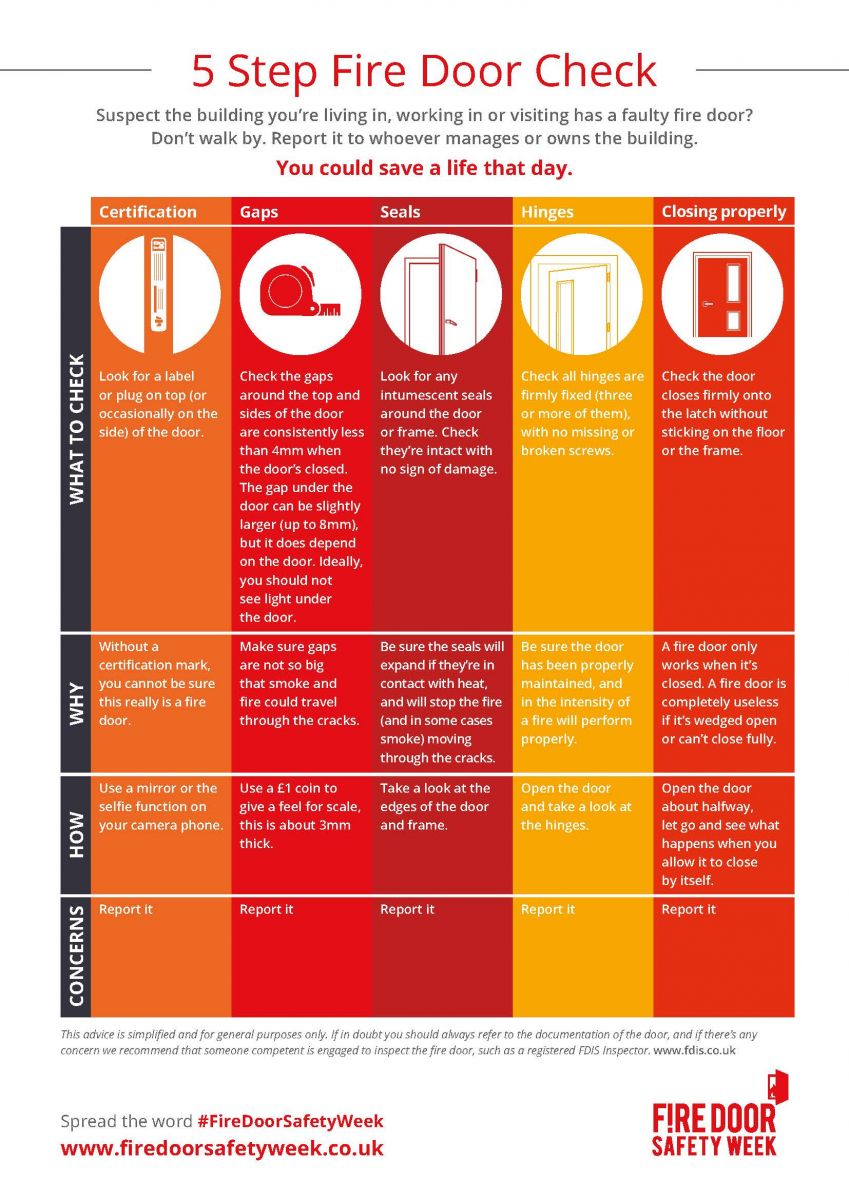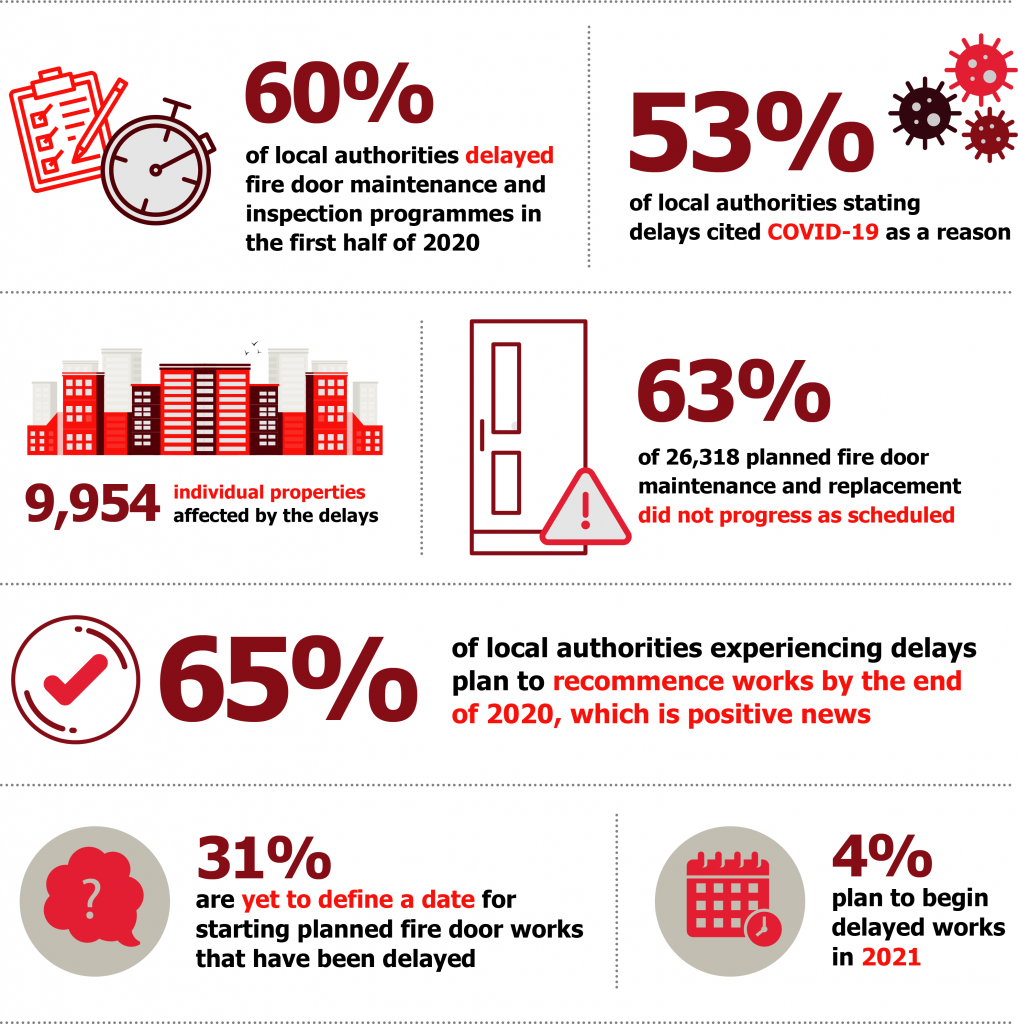Are E-Scooters Igniting a Silent Workplace Safety Crisis?
New research to mark Fire Door Safety Week reveals that a combination of a surge in lithium-ion battery fires from e-bikes and e-scooters, along with poor fire door...
Read Full ArticleFire Door Safety Week is an awareness program set up in 2013 by the British Woodworking Federation, drawing attention to maintaining related security and upholding the regulations set in the 2005 Fire Safety Order.
The last six years has seen an evolving campaign reaching for the building industry and property owners to understand guidelines on the following:
These specifically weighted and sealed units help keep a fire restrained to one room for as long as possible. The standard required for the Fire Safety Order (FSO) is rated at 30 minutes of smoke and fire containment– it will not fulfil this function if it is damaged, or obstructed. Some specific buildings will require doors to be rated at 60 minutes of protection.
One in two (51 per cent) care home workers who reported fire safety concerns were dissatisfied with the actions (if any) subsequently taken, according to a survey taken in 2019 by the British Woodworking Federation (BWF) Fire Door Alliance division. Last year’s awareness week focused on the residential care industry and the aforementioned research found that it would take 25 minutes to evacuate on average.
The degradation of these doors can appear to be a non-priority in the busy day to day office environment, however, it is, of course, imperative that property owners stay vigilant with upkeep. Vital in conjunction with fire alarms to stop the spread of an unexpected fire and give people time to exit the premises, they are the first line of passive defence in any commercial building.
Considering the impact minor defects could have in an emergency is a responsibility that must be undertaken by a property authority. Aside from the concern for life loss, the consequent disciplinary actions for negligence are appropriately serious.
The specifications for fire doors in new builds are specified by the government, and are dependent on the type of property development. The evolving guidelines in the FSO must be accommodated by existing buildings– for example the 19 March 2020 amendment made individual flat entrance doors necessary, where the external walls of the building have unsafe cladding, bringing progress from the conditions of the Grenfell disaster.
In the life of a fire door, everyone involved is responsible for making necessary checks to ensure standards do not slip. It is risky to allow any slack to be picked up at the next step, considering the impact minor defects could have in an emergency. This includes but is not limited to the following titles:
Architect or Specifier
Developer/Contractor
The Merchant
The Door Installer/Fitter
Building Control/Approved Inspectors/Fire Departments
Owners/Facilities Managers/Other Competent Persons
For the majority of time in use, the facilities managers and designated employees will be in charge of regularly checking for changes in their fire door safety.
Described at length in the BWF’s knowledge centre, the consequent graphic illustrates the key points for regulating fire doors in the workplace or in a building. It may seem like these are only necessary to check once, however that would leave room for error in a circumstance where there are no second chances. There are specific considerations for different responsible professions, therefore it is important to familiarise yourself with these at the link above, particularly with installation. Bringing a professional inspector in for a thorough assessment every six months is highly recommended, however, this can be achieved with well trained internal staff. For high use/quantity buildings, this should be completed every three months.

Picture: a simplified 5-step fire door check, distributed as part of Fire Door Safety Week
As more people have been working from home in 2020, a couple of points are worthwhile to keep in mind for your private office space, in the absence of fire doors and delegated management.
Keeping ordinary doors shut will still help to compartmentalise a building. In order to avoid the risk of an electrical fire in your home office, take special care in the organisation of electronics and checking the condition or most recent test your plugs, sockets and extension leads have been subjected to. The National Fire Chiefs Council urged that employers should encourage employees to consider such minor details, as an important addition to re-considering fire risk in the workplace during the pandemic.
Without the structure of office work, it can be tempting to blend lunch and smoke breaks with working time and some choose to smoke indoors. Remember that if you are focused on your work, you may not be focused on cooking food or idle cigarettes.
Regularly checking the operation of fire alarms is an important measure to remind everyone and anyone of. Although all property managers are required by law to test smoke detectors monthly (unless the responsibility is legitimately delegated), at home you may not have such a routine. Consider committing to this on a consistent basis if you are spending more time in your house.
FOI requests were issued to all UK local authorities in July 2020, with all data recieved by 25 August 2020 (from 147 local authorities) collated and included in the analysis. Questions concerned planned fire door works and inspections between Januart and June 2020, and specifically asked whether delays occurred, the numbers of doors and properties affected, and plans for recommencing works. It is worth bearing in mind that the pandemic will have affected the statistics– however fires risks do not dissapear in a lockdown.
Over half (52 per cent) of the authorities reported delays to planned fire door maintenance and replacement in the first half of 2020. The number rises to 60 per cent when inspection delays are also factored in.
Not all responding local authorities provided reasons for delay, but over half (53 per cent) of those experiencing delays cited COVID-19-related restrictions, including limited property access and availability of contractors due to social distancing guidelines. However, it was positive that several local authorities proactively mentioned that emergency repair works to fire doors continued throughout the lockdown period to maintain the safety of residents.

Picture: a graphic showing the results of the study on fire door maintenance delays.
This research makes it clear that a priority is being sidelined, and suggests that the wider private property market is suffering similarly. With many going back to work and the possibility of a second lockdown, Fire Door Safety week comes at a vital time as a reminder.
Picture: the Fire Door Safety Week promotional banner.
Article written by Bailey Sparkes | Published 22 September 2020
New research to mark Fire Door Safety Week reveals that a combination of a surge in lithium-ion battery fires from e-bikes and e-scooters, along with poor fire door...
Read Full ArticleKirk Smith from Allegion UK reviews the attitudes towards passive fire protection in public-facing buildings and why being more proactive with fire door safety can help...
Read Full ArticleLondon Fire Brigade has announced it will no longer respond to daytime activations of automatic fire alarms in most non-residential buildings from October...
Read Full ArticlePTSG has completed its first overseas acquisition, purchasing a fire solutions firm that operates across the Netherlands. Flame Control specialises in fire alarm...
Read Full ArticleNew research shows that asthmatics in Oxford had fewer hospital stays in 2020, largely due to reduced air pollution during the national lockdown. Falling...
Read Full ArticleIn its tenth year of promoting fire door safety, the British Woodworking Federation reports that the majority of people can’t identify a faulty fire door. A...
Read Full ArticleFalse fire alarms are costing SMEs in the UK almost £7 million every single year. The figure comes from research conducted by Red Fox, commissioned by Hochiki...
Read Full ArticleFirefighter Instructors - those who train firefighter staff across the UK and typically face up to five to ten times the number of live fires compared to regular...
Read Full ArticleKirk Smith of Allegion UK discusses fire door neglect and how to spot the potential faults that could be compromising your fire safety procedures. Kirk Smith is...
Read Full ArticleDetailed in the UK Governments Autumn and Winter Plan, option B could see the re-introduction of masks and other restrictions. What does this mean for the newly...
Read Full Article